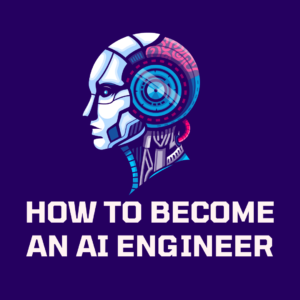Introduction: How to Become an AI Engineer, The field of artificial intelligence (AI) is rapidly expanding, with applications ranging from autonomous vehicles to personalized recommendations on streaming platforms. As the demand for AI solutions grows, so does the need for skilled AI engineers. These professionals are at the forefront of technological innovation, creating algorithms and models that enable machines to learn and make decisions. Becoming an AI engineer involves a blend of strong technical skills, theoretical knowledge, and practical experience. This guide will explore the essential steps and qualifications needed to embark on a career as an AI engineer, providing a roadmap for those aspiring to enter this exciting and dynamic field.
AI engineers in today’s time are earning in crores, and now it’s your chance to live your dream life through career in AI

What exactly an AI Engineer Do (How to Become an AI Engineer)
Curious about what an AI engineer actually does? Let’s break it down! AI engineers are the masterminds behind AI models, using machine learning algorithms and deep learning neural networks to extract valuable business insights. These insights help organizations make decisions that can influence their entire operations.
Depending on their goals, AI engineers create either weak or strong AI systems. They have a solid grasp of programming, software engineering, and data science, allowing them to process data and develop and maintain AI systems efficiently.
AI engineers work on a variety of applications. For instance, they might create contextual advertising systems based on sentiment analysis, develop visual identification or perception tools, or build language translation services.
Now that you know what an AI engineer does, let’s dive into the specific responsibilities and skills required to excel in this role.
Complete Steps on How to Become an AI Engineer after 12th
Interested in becoming an AI engineer right after your 12th standard? This guide provides a comprehensive roadmap, outlining the essential steps from obtaining your secondary school diploma to gaining practical experience. Whether you’re pursuing a bachelor’s degree, seeking certifications, or aiming for hands-on projects, we’ll cover everything you need to know to launch a successful career in artificial intelligence.
Let’s get started on your journey to becoming an AI engineer
- First Qualify Secondary School
Let’s start with the basics! The first step to becoming an AI engineer is to earn your secondary school diploma with a focus on scientific disciplines like chemistry, physics, or mathematics. Adding statistics to your foundational subjects will also be beneficial. A strong background in these areas will provide you with a solid foundation for future learning and set you up for success in the field of artificial intelligence.
- Complete a Bachelor’s Degree
Next up, you need to pursue a bachelor’s degree. You have options here: you can enroll in a Bachelor of Science (B.Sc.) program that typically lasts three years, or a Bachelor of Technology (B.Tech.) program that lasts four years. Alternatively, you could earn an engineering degree in a related field like information technology or computer science and then specialize in artificial intelligence, data science, and machine learning. If you’re aiming for prestigious engineering institutions like NITs, IITs, and IIITs, you’ll need to perform well on the Joint Entrance Examination (JEE).
- Follow a Master’s Degree
Want to boost your chances of landing a top AI engineering job and increase your earning potential? Consider pursuing a master’s degree in artificial intelligence or a related discipline. This advanced education will give you a deep understanding of AI and equip you with specialized technical skills.
- Go for Certifications
If a master’s degree isn’t on your radar, don’t worry! You can still enhance your skills by participating in artificial intelligence courses or diploma programs. These certifications can be a cost-effective way to gain expertise. There are graduate and post-graduate degrees available in AI and machine learning that you might want to explore.
So, you’re thinking about becoming an AI engineer? That’s fantastic! There are many paths you can take to get there, starting right after your 12th standard. You can dive straight into undergraduate programs like M.C.A, B.Tech in AI, B.Sc in AI and ML, BCA in AI, BE in AI, or even pursue a Diploma in AI. These programs will provide you with a solid foundation in artificial intelligence and machine learning.
But what if you’re already studying something else or want to keep your options open? No problem! There are also short-term online and offline certification courses in AI and ML that you can take alongside your current studies. These certifications can give you the skills you need to break into the field of AI without committing to a full degree program.
By now, you should have a good idea of how to start your journey toward becoming an AI engineer and launching your career in this exciting field.
Job Roles an AI Engineer can take Up (How to Become an AI Engineer)
Becoming an AI engineer is just the beginning. It’s equally important to understand which industry you want to work in. AI is used across a variety of sectors, including healthcare, education, finance, and more, leading to a boom in career opportunities. Let’s take a look at some exciting job roles you might pursue:
AI Developer: Imagine working alongside electrical engineers to develop software that powers intelligent robots. As an AI developer, that’s exactly what you’ll do! Your work will bring cutting-edge AI technologies to life.
AI Architect: Do you enjoy solving complex problems and working with clients? AI architects do just that by providing business and system integration services. They also create and maintain the entire AI architecture, ensuring systems run smoothly and efficiently.
Machine Learning Engineer: If building predictive models using vast amounts of data sounds exciting, then a role as a machine learning engineer could be for you. You’ll need a deep understanding of machine learning and deep learning algorithms to succeed in this role.
Data Scientist: Love working with data? Data scientists collect, clean, analyze, and interpret large datasets. By leveraging machine learning and predictive analytics, they uncover insights that drive business decisions.
Business Intelligence Developer: Interested in identifying business and market trends? Business intelligence developers design, model, and analyze complex data to provide valuable insights. Their work helps companies stay ahead of the competition.
Understanding these roles will help you decide which career path aligns with your interests and skills.
AI Engineer Salary (How to Become an AI Engineer)
According to AmbitionBox, the average starting salary for an AI Engineer in India is approximately 3.0 Lakhs per year (25,000 per month).
Notably, no prior experience is necessary to enter this field.
The potential earnings for AI Engineers can be substantial, with the highest salaries reaching up to 22.0 Lakhs per year (1.8 Lakhs per month).
Frequently Asked Questions (FAQs) About How to Become an AI Engineer
- Is pursuing a career in AI engineering worthwhile?
Absolutely! AI engineering is a booming field with immense potential. As more organizations integrate AI technologies, the demand for skilled AI engineers is surging. These professionals can find opportunities across various sectors, including healthcare, finance, and manufacturing, with ample prospects for career advancement.
- Is AI engineering difficult to master?
AI engineering can be quite challenging, especially for those new to the field. It requires a strong foundation in computer science, programming, and mathematics. However, with the right education, practice, and dedication, you can become proficient. Mastery involves learning machine learning algorithms, programming languages like Python, and gaining experience in data management and analysis.
- Can you become an AI engineer without a formal degree?
Yes, it is possible to become an AI engineer without a traditional degree. While degrees in computer science, mathematics, or statistics are common, many successful AI engineers have acquired skills through online courses, bootcamps, and practical experience. Key requirements include a solid understanding of programming, data structures, and algorithms, along with a commitment to continuous learning.
- How long does it take to become proficient as an AI engineer?
The timeline to become an AI engineer varies based on your current knowledge and the learning path you choose. On average, it can take about 6 to 12 months to acquire the necessary skills and knowledge, depending on the intensity of your studies and the time you dedicate to learning.
- How can I start a career in AI after completing 12th grade?
After 12th grade, you can pursue a bachelor’s degree in computer science, data science, or artificial intelligence. Focus on learning programming, mathematics, and machine learning concepts. Additionally, consider further education or certifications to deepen your expertise in AI.
- What is the average salary of an AI engineer in India?
In India, the salary of an AI engineer can vary widely based on experience, location, and employer. Entry-level AI engineers typically earn between INR 6 to 10 lakhs per annum. With more experience and expertise, salaries can increase significantly, potentially reaching several lakhs or more.
- Are AI engineers well-compensated?
Yes, AI engineers are generally well-compensated due to the high demand for their specialized skills. Salaries vary based on factors like experience, location, and industry, but AI engineers often receive competitive compensation packages reflecting their expertise in AI and machine learning.
Sharing is appreciated






